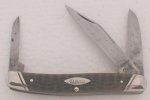This is my first visit to this forum and first look at this thread. Wow, there is some great stuff here! (Excellent photography too!)
As the saying goes; "William Scagel influenced Bo Randall and Randall influenced everyone else." It was Scagel who is remembered for establishing, some 100 years ago, what has become the standard business template for almost all modern custom knifemakers... one maker working alone in his shop - each knife made by hand and totally unique.
Scagel's knives were what we might now call "organic." To me, the essence of "organic" in this context refers to Scagel's inclination and talent for creatively incorporating aspects of the natural world into the design and execution of his knives. It began with his use of natural materials, and often went beyond the materials into the realm of metaphor and symbolism - as is evident in the knife below.
This unique knife has long been referred to as simply
'the fish knife.' Ed Fowler was so smitten with it that he spent considerable time analyzing it in detail. Ed came up with many important insights which he shared in an article for BLADE magazine some years back. Ed Fowler, for reasons he explains in his article, coined the knife's now 'official' name -
Iron Mermaid of the Great Lakes (also the title of his article).
She (Ed's preferred way of referring to a beautiful knife) occupies a special place in Dr. Jim Lucie's mind-blowing collection of W. W. Scagel knives, axes, artifacts and memorabilia.
Photographing these old antique knives is fun and always a challenge. I usually try to create an appropriate context for each knife. In this case I created a 'watery' backdrop apropos of the knife's identity.












